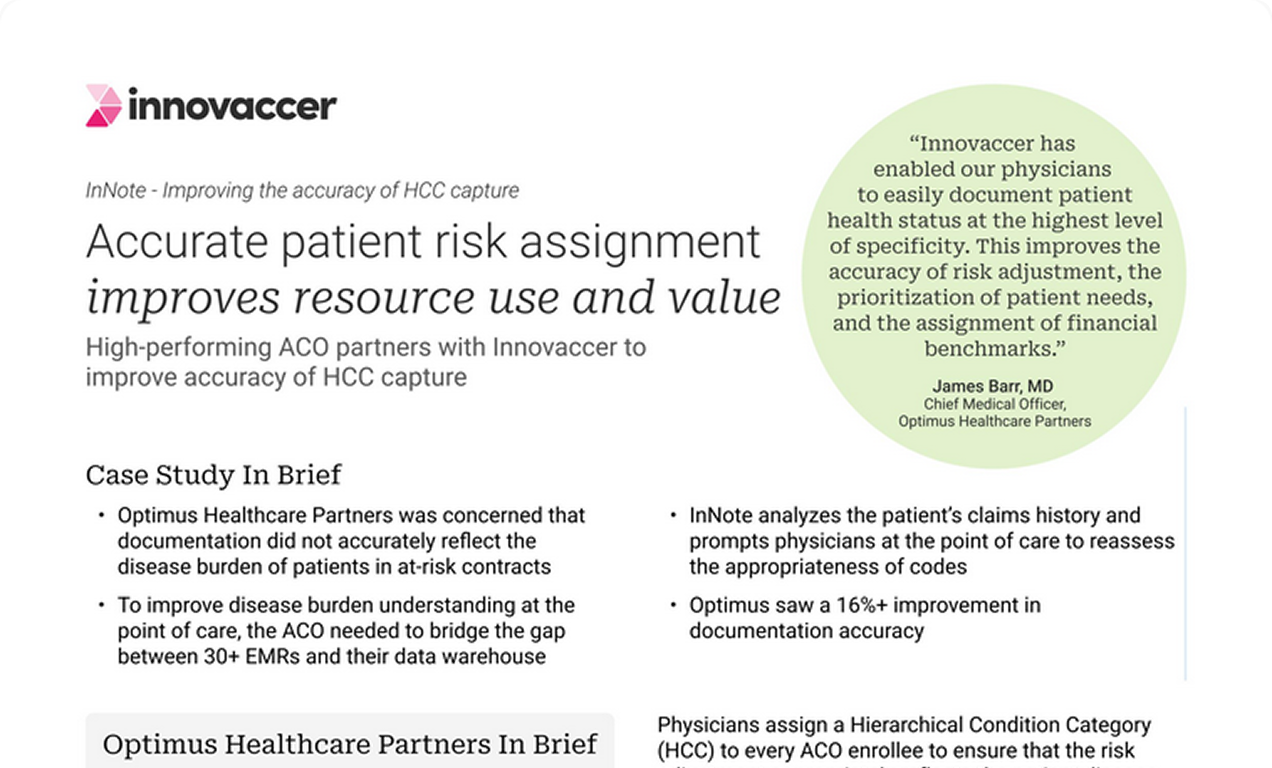Comprehensive Care for CKD: A Value-Based Approach to Kidney Health


Did you know? CKD or Chronic Kidney Disease affects almost 35.5 million Americans, with many more at risk. Despite the high number, about 90% of patients with early-stage CKD still remain undiagnosed. As the disease progresses, it leads to kidney failure, cardiovascular issues and ultimately, death. The need for proactive chronic kidney disease management is growing as regulatory changes push for earlier detection and intervention in chronic diseases, aligning with CMS Final Rules.
In addition, the economic burden is equally concerning. Medicare alone spends about $120B annually on CKD and ESRD (End Stage Renal Disease), which accounts for 20% of Medicare expenditures…but for less than 1% of beneficiaries.
Traditional fee-for-service models of nephrology prioritizes volume over outcomes, potentially disincentivizing early intervention and delaying care until later in the disease course. This model sends care across numerous specialists, creating treatment gaps in continuity. Worse, it fails to encourage prevention, education, or comprehensive care that could slow disease progression and improve patients' quality of life.
Value-based nephrology shifts the focus from service volume to patient outcomes, transforming CKD care. With whole-person care coordination, clinicians can identify at-risk patients earlier, apply targeted interventions, and reduce expensive complications. Value-based kidney care models decrease hospitalization, reduce ED use, and slow progression to dialysis - by leveraging AI-driven risk stratification and predictive analysis.
Challenges of CKD Management in a Fragmented System
- Late diagnosis is the main barrier to successful management of CKD. The majority of patients are detected only at late stages, by which time treatment becomes more costly, with poorer outcomes.
- Increased demand for coordinated care among primary care physicians, nephrologists, endocrinologists, and cardiologists can leave significant treatment gaps. Patients get conflicting recommendations and poor disease management without integrated care plans.
- Patient engagement barriers are rooted in intricate treatment regimens, low health literacy, and psychosocial issues. Most patients are unable to grasp their condition or make required lifestyle changes without the proper guidance.
- Steep readmission rates beset CKD treatment, with high 30-day readmission rates among advanced disease patients (nearly twice that of other chronic illnesses), reflective of system-level failures.
- The cost burden grows exponentially with advancing CKD, with per-patient costs rising to over $100,000 in dialysis patients from $15,000 in Stage 3, making the economic case for early intervention and improved management even more compelling.
A Value-Based Approach to CKD Care
Value-based kidney care restructures delivery models to prioritize prevention, early intervention, and holistic patient management. This approach empowers multidisciplinary teams to implement evidence-based protocols that align with patients' individual needs and circumstances. In fact, CMS prioritized a CKD program that started in 2023 aimed at improving outcomes and reducing costs for Medicare beneficiaries with chronic kidney disease and end-stage renal disease through coordinated, patient-centered care.
By focusing on quality metrics like slowed disease progression, reduced hospitalizations, and improved quality of life - rather than service volume - providers and payers share accountability for meaningful outcomes. This model strengthens collaboration between PCPs and nephrologists, enabling early CKD detection, better comorbidity management, and reduced progression-related costs. The result is a care ecosystem that delivers greater value to all stakeholders - especially patients.
Key Components of a Comprehensive CKD Care Model
- Early Identification and Risk Stratification are the pillars of successful chronic kidney disease management. Having systematic screening practices for high-risk groups allows the identification of kidney disease at its earliest, most treatable stages. Big data analytics can analyze clinical information to stratify patient cohorts based on risk profiles, permitting care teams to target interventions in those with the highest likelihood of progression. Early intervention makes it possible to provide timely specialist referrals and personalized care plans addressing individual patients' particular risk factors.
As healthcare providers have demonstrated through economic modeling, targeted pharmaceutical interventions can significantly impact disease progression when identified early. In one documented implementation, pharmacist-led initiatives to increase prescription of renoprotective medications for just 100 high-risk patients resulted in projected savings of approximately $3 million over three years - a compelling business case for early intervention and specialized medication management. - Care Coordination and Patient Engagement fill essential gaps in conventional models of care. Patients can be assigned dedicated care coordinators to ensure smooth transitions among providers and settings. Individualized education prepares patients with information on their condition, and motivational interviewing strategies create behavior change to enhance self-management. Digital health resources provide reinforcement between visits through medication reminders, symptom monitoring, and on-demand educational materials that reinforce clinical advice and enhance the patient-provider relationship.
One key insight from successful programs is the emphasis on educating patients about modifiable risk factors. Leading organizations have found that many patients don't understand how their health behaviors directly affect disease progression. By helping patients see the connection between behaviors (like controlling blood pressure and diabetes) and outcomes, care managers enable more informed shared decision-making and stronger patient engagement in their own care journey. - Optimizing Treatment Pathways includes standardizing evidence-based practices with flexibility to accommodate each patient's needs. Clinical decision support helps clinicians apply best practices on a consistent basis to comorbidities that hasten kidney injury. Medication therapy management supports appropriate prescribing, reduces nephrotoxic drugs, and maximizes renoprotective therapy. Advanced care planning conversations take place on a proactive basis, with patients informed of their dialysis, transplant, or conservative therapy options prior to kidney failure.
Measuring Success: Key Performance Metrics for CKD Care Transformation
Effective value-based kidney care demands robust metrics that capture both clinical and financial outcomes. Clinical quality indicators should include rates of CKD progression, blood pressure control, glycemic management for diabetic patients, and appropriate medication utilization. Utilization metrics track reductions in preventable hospitalizations, emergency department visits, and transitions to dialysis. Patient-reported outcomes measure improvements in quality of life, symptom burden, and satisfaction with care. Financial performance indicators demonstrate cost savings through reduced complications and appropriate resource utilization. These comprehensive metrics create accountability and drive continuous improvement in chronic kidney disease management programs.
The Future of CKD Management: Leveraging Technology and Innovation
Technological advancements are transforming CKD care through remote monitoring solutions that track vital signs, symptoms, and medication adherence between clinical visits. Predictive analytics identify subtle signs of deterioration before traditional metrics detect changes, enabling earlier intervention. Artificial intelligence tools assist with clinical decision-making by synthesizing complex patient data and recommending personalized interventions. Telehealth expands access to nephrology expertise in underserved areas while reducing barriers to care. These innovations, combined with emerging biomarkers and precision medicine approaches, promise to revolutionize kidney care by enabling truly personalized treatment plans based on individual risk factors and disease mechanisms.
How Innovaccer Is Transforming CKD Management
Innovaccer's comprehensive chronic kidney disease management solution responds to the complete range of kidney care challenges using its best-in-class data activation platform. Unifying fragmented sources of healthcare data, Innovaccer constructs an integrated patient record that supports the early identification of high-risk patients using advanced predictive analytics. Intelligent care management workflows of the platform automate risk stratification enabling care teams to prioritize intervention for high-risk patients before their disease advances to advanced CKD stages.
As emphasized by healthcare leaders in recent forums, Innovaccer's platform allows providers to detect CKD outliers using advanced risk stratification and claims analysis. The system directly integrates with EMR data to monitor key markers such as GFR levels, generating automated triggers for patient outreach at various stages of disease. This feature is especially useful for detecting "high-cost, low-volume" populations - patients who are a small percentage of members but account for disproportionate healthcare expenses.
The Innovaccer Health Cloud fuels end-to-end care coordination by customizable care paths tailored for the management of CKD. Evidence-based guidelines blend with provider workflows to standardize best practices in the care continuum. Real-time performance dashboards present key metrics - such as disease progression rates, medication adherence, and avoidable utilization - to support ongoing quality improvement.
In one reported deployment with a large employer-sponsored health plan with 24,000 members, the system found that fewer than 0.5% of members had CKD stages 3-5, but this small number consumed about 7% of the entire plan budget. Each successive stage of CKD drove the monthly per-member cost exponentially higher - as much as $45,000 per month for dialysis patients. Through this business case identified through data analysis, Innovaccer assisted the organization in developing a targeted intervention team comprising a medical director, pharmacy experts, and dialysis center-experienced nurses.
To know more, watch our webinar on Mastering Chronic Kidney Disease .
Innovaccer's patient engagement tools bridge critical gaps between clinical visits, providing personalized education, medication reminders, and symptom tracking through intuitive mobile interfaces.
Take Action Today
Ready to transform your approach to chronic kidney disease management? Innovaccer's comprehensive solutions can help your organization identify at-risk patients earlier, implement evidence-based interventions, and measure the impact on clinical and financial outcomes.
Schedule a personalized demo to see how our unified data platform, intelligent workflows, and patient engagement tools can help you build a sustainable, value-based kidney care program.


.png)






.avif)









.svg)
.svg)

.svg)

